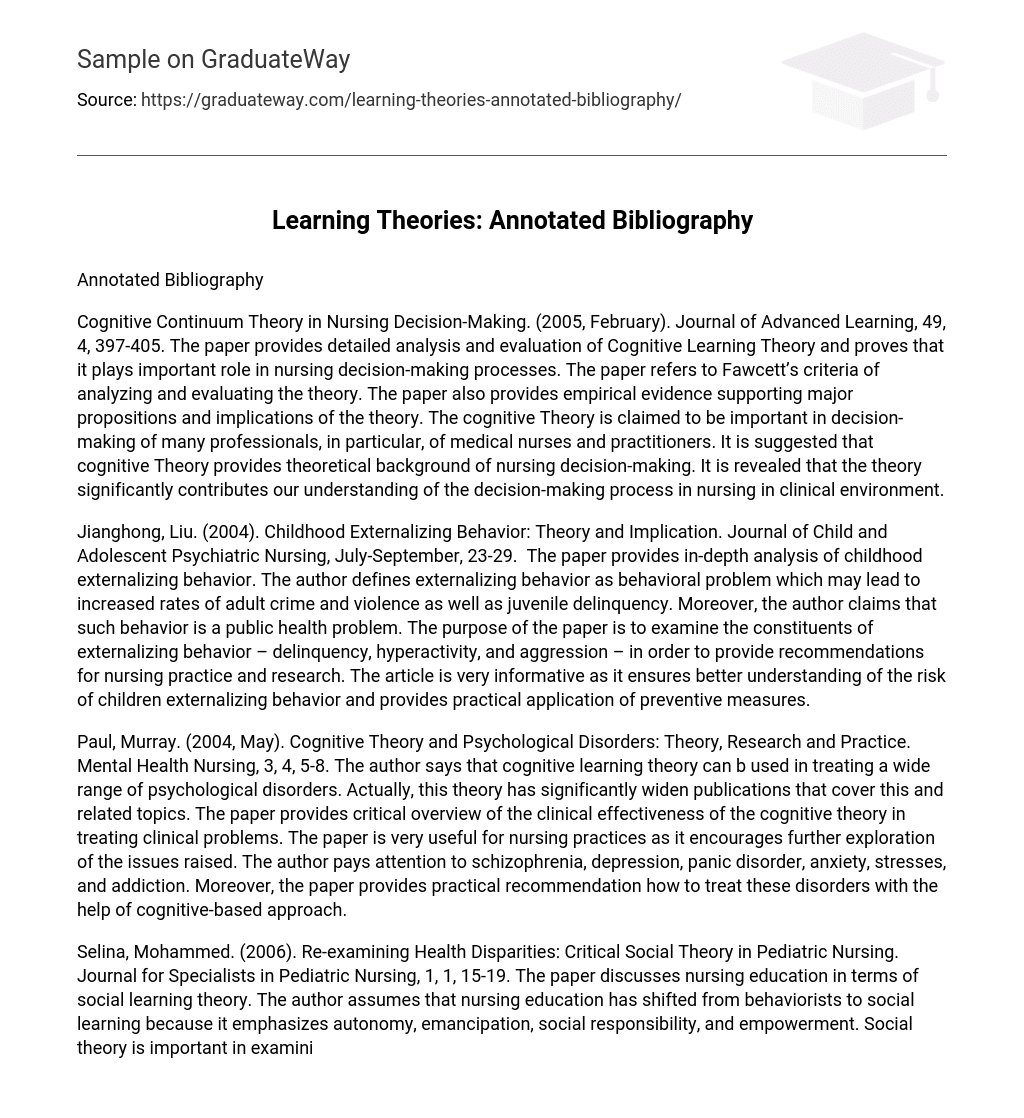Cognitive Continuum Theory in Nursing Decision-Making. (2005, February). Journal of Advanced Learning, 49, 4, 397-405.
The paper provides detailed analysis and evaluation of Cognitive Learning Theory and proves that it plays important role in nursing decision-making processes. The paper refers to Fawcett’s criteria of analyzing and evaluating the theory. The paper also provides empirical evidence supporting major propositions and implications of the theory. The cognitive Theory is claimed to be important in decision-making of many professionals, in particular, of medical nurses and practitioners. It is suggested that cognitive Theory provides theoretical background of nursing decision-making. It is revealed that the theory significantly contributes our understanding of the decision-making process in nursing in clinical environment.
Jianghong, Liu. (2004). Childhood Externalizing Behavior: Theory and Implication. Journal of Child and Adolescent Psychiatric Nursing, July-September, 23-29.
The paper provides in-depth analysis of childhood externalizing behavior. The author defines externalizing behavior as behavioral problem which may lead to increased rates of adult crime and violence as well as juvenile delinquency. Moreover, the author claims that such behavior is a public health problem. The purpose of the paper is to examine the constituents of externalizing behavior – delinquency, hyperactivity, and aggression – in order to provide recommendations for nursing practice and research. The article is very informative as it ensures better understanding of the risk of children externalizing behavior and provides practical application of preventive measures.
Paul, Murray. (2004, May). Cognitive Theory and Psychological Disorders: Theory, Research and Practice. Mental Health Nursing, 3, 4, 5-8.
The author says that cognitive learning theory can b used in treating a wide range of psychological disorders. Actually, this theory has significantly widen publications that cover this and related topics. The paper provides critical overview of the clinical effectiveness of the cognitive theory in treating clinical problems. The paper is very useful for nursing practices as it encourages further exploration of the issues raised. The author pays attention to schizophrenia, depression, panic disorder, anxiety, stresses, and addiction. Moreover, the paper provides practical recommendation how to treat these disorders with the help of cognitive-based approach.
Selina, Mohammed. (2006). Re-examining Health Disparities: Critical Social Theory in Pediatric Nursing. Journal for Specialists in Pediatric Nursing, 1, 1, 15-19.
The paper discusses nursing education in terms of social learning theory. The author assumes that nursing education has shifted from behaviorists to social learning because it emphasizes autonomy, emancipation, social responsibility, and empowerment. Social theory is important in examining health disparities because it helps to explore the relations between heal and social factors.
Tourville, Ch., & Ingalls, K. (2003, July 1). The Living Tree of Nursing Theories. Nursing Forum, 2, 3, 12-21.
The paper discusses the behavioral learning theories which are used in nursing practices. In particular, the theories are developmental, systems, and interactive. The purpose of the paper is to provide theoretical and practical framework for nurses how to incorporate nursing theories. The authors claim that The Living Tree is very important because it helps to organize different learning theories and nurses will apply them to practice more effectively. The Living Tree is entailed with historical value and has deep roots. The Tree is virtual, and it represents major nursing theories. The authors say that the roots are “the four meta-paradigms defined as person, environment, health, and nursing”.
References
- Cognitive Continuum Theory in Nursing Decision-Making. (2005, February). Journal of Advanced Learning, 49, 4, 397-405.
- Jianghong, Liu. (2004). Childhood Externalizing Behavior: Theory and Implication. Journal of Child and Adolescent Psychiatric Nursing, July-September, 23-29.
- Paul, Murray. (2004, May). Cognitive Theory and Psychological Disorders: Theory, Research and Practice. Mental Health Nursing, 3, 4, 5-8.
- Selina, Mohammed. (2006). Re-examining Health Disparities: Critical Social Theory in Pediatric Nursing. Journal for Specialists in Pediatric Nursing, 1, 1, 15-19.
- Tourville, Ch., & Ingalls, K. (2003, July 1). The Living Tree of Nursing Theories. Nursing Forum, 2, 3, 12-21.





